GT investigation: Is China’s job market facing risk of social instability?
Nearly 9 million graduates struggle for jobs
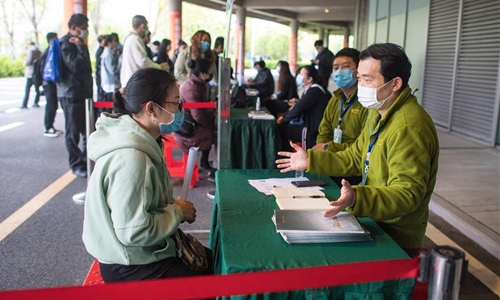
A staff member from a company communicates with a job applicant at an on-site job fair in Wuhan, central China's Hubei Province, April 21, 2020. An on-site job fair was held in Wuhan on Tuesday with strict epidemic prevention measures. Over 1,600 job vacancies from more than 40 enterprises were offered to applicants, involving a variety of industries like food, pharmaceuticals, logistics, manufacturing, garment, agriculture, etc. To offset COVID-19's impact on the job market, China has taken measures to ensure employment and promote work resumption, according to the Ministry of Human Resources and Social Security (MHRSS). Photo:Xinhua
Editor's Note:In the epic global struggle to recover from the coronavirus crisis, many observers agree that in China, unemployment has become the most pressing issue - more pressing than a historic 6.8 percent contraction in GDP - that needs to be dealt with urgently as it pertains to the country's economic and social stability.
Assessments vary about the severity of China's unemployment problem: from those who espouse the official data suggesting a "generally stable" job market to doomsday international media speculation of inevitable mass layoffs and social unrest. Some foreign media reports also questioned official unemployment figures and even suggested the Chinese economy and the entire country could be on the verge of collapse.
The divergence begs the question: How is China's job market doing? Is official data overly optimistic? Are foreign media over-exaggerating? Is China really facing the risk of social unrest?
In an attempt to answer these questions, the Global Times (GT) investigated three key labor market groups: new graduates, migrant workers and employees of export-related firms. The three groups not only make up the majority of China's labor force but also are believed to pose the most serious risk to social stability.
In this several-part series, GT will share the personal stories of people from these three groups, dig into the official data and sort through policies - all to provide a fuller, more objective picture.
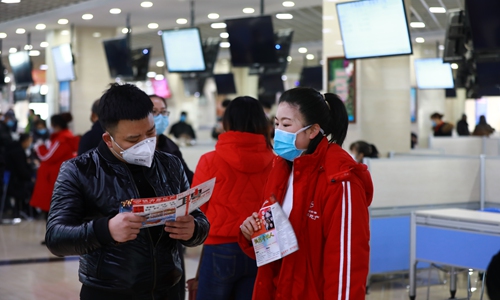
Job seekers at a job fair in Changchun, Northeast China's Jilin Province on March 12 Photo: IC
Even before the virus, Qubi Xiaolin, a university student in Chengdu, Southwest China's Sichuan Province, decided to play it safe and hedge her plans for a choice of futures.Due to graduate this fall, the 23-year-old undergraduate of ethnic minority literature at Southwest Minzu University registered to take an exam to become a government official, but while also preparing for a graduate school exam.
"I don't know what happens now. There is no information about the exams," Qubi told the Global Times.
As Qubi applies her talents toward a government job in Southwest China, Zhao Ximin, a student of film studies from the University of Southern California, is determined to join the country's film industry.
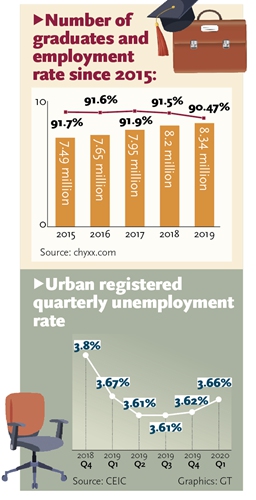
Despite their vastly different backgrounds and career goals, they share an identical uncertainty about finding a job this year.
Zhao told the Global Times she sent out more than 20 resumes for a film editing or import job, but has not received a single reply.
"I'm really concerned as this year's job market has been hard hit by the coronavirus, especially the film industry," Zhao said.
Qubi and Zhao are just two individuals whose experience reflects the multifaceted challenges faced by millions of new graduates in a job market hit by a one-two punch: a multi-year economic slowdown, then COVID-19.
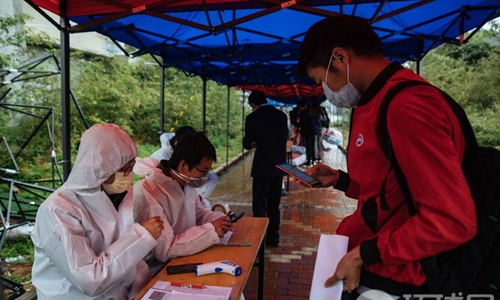
Job seekers register and have their temperature taken before an interview with Foxconn in Wuhan on April 20. Photo: Li Hao/GT
Biggest challenge
A record number of 8.74 million graduates will enter the job market this year, official data shows. Factoring in around 300,000 students from overseas and unemployed graduates from the year before, the total figure could reach as much as 9 million, about the equivalent of the entire population of Israel.
New graduates make up about 60 percent of China's total new labor population of 15 million each year, highlighting the enormity of the country's challenge in tackling rising unemployment.
Addressing employment for new graduates is one of the government's most important tasks not simply because of the coronavirus pandemic, Cong Yi, a professor at the Tianjin University of Finance and Economics, told the Global Times.
The task is also related to the industrial upgrade of the Chinese economy, Cong noted, given that jobs for graduates are usually higher-paying and more advanced.
Young graduates are also among the most vibrant group in social and economic development and a crucial factor of social stability, as some foreign media have been quick to highlight.
In an article in March, the New York Times suggested young Chinese had been "content to relinquish political freedoms" as long as the Communist Party of China provided jobs and upward mobility.
That could change with the coronavirus, the article suggested.
Many other media outlets, including the Financial Times, have suggested China has likely been underreporting unemployment and was failing to assist those who lost their jobs in the pandemic.
Interviews with half a dozen graduates and analysts and analysis of official data showed that while official figures might have not captured the whole picture due to methods of accounting, the situation was far from being so severe that social unrest appeared imminent.
More importantly, many noted that the country is gradually returning to normalcy and there are pending policy initiatives that address the grim job market.
China reported a near record-high urban unemployment rate of 5.9 percent in March. Officials were quoted as saying in Chinese reports that the job market nonetheless remained "generally stable."
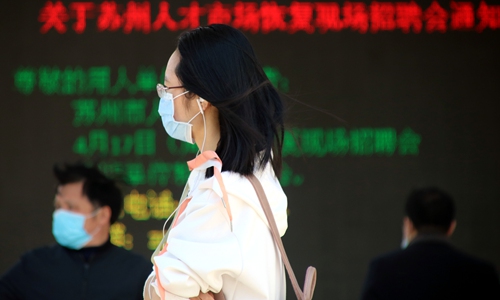
A spring job fair debuts in Suzhou, East China's Zhejiang Province on Saturday with 38 companies offering 768 jobs. Suzhou has held several job fairs while using sound prevention measures against the coronavirus. Photo: cnsphoto
Analysts pointed out the figure only represented the urban work force: The statistics do not take account of informal jobs and new labor force like college graduates.Qubi said that only a few in her class of more than 300 had found employment.
Many classmates were considering pursuing higher education because of the tough situation this year.
The number of positions available for new graduates fell 16.77 percent in the first quarter of 2020, while the number of applicants increased 69.82 percent, according to a report from the China Institute for Employment Research (CIER) and the Zhaopin.com job platform.
Those graduates who received offers say the salaries are low.
A media studies graduate from a university in Hong Kong, who preferred to be referred to by her last name "Liu," said she had received two unappealing work offers from Beijing.
"For the jobs I like, they delayed recruitment for fear of spread of coronavirus," she told the Global Times, "but I can't wait for good opportunities too long and may eventually miss them."
Bright spot
There are relatively brighter spots in the CIER-Zhaopin report.
For example, the education, construction, the internet, insurance, biological and pharmaceutical sectors have experienced much less competition than other sectors.
With work resuming earlier, China's job market is in a better position than countries such as the US, where 26 million have lost their jobs and the pandemic remains largely unabated, according to Li Chang'an, a professor at the department of public economics at the University of International Business and Economics in Beijing.
"A higher level of work resumption will provide a large batch of job opportunities," Li told the Global Times.
Opportunities remained in areas such as the internet, big data and financial services, Li said, although new graduates might need to adjust expectations.
Chinese analysts also highlighted a slew of official measures by central and local governments to help ease pressure on new graduates.
They noted that protecting the job market has become a top priority for China's top leaders, who have called for more targeted measures, including massive fiscal incentives, to support both employers and employees.
Government agencies including the Ministry of Education have also helped with online jobs fairs and delayed requirements for licenses for certain jobs.
Universities and governments have also pitched in. For example, East China's Jiangsu provincial government started an online registration platform that links new graduates with potential employers. East China's Anhui Province announced that a 3,000 yuan ($423.6) incentive for any small business that hired a new graduate.
If all the provinces follow suit by rolling out such incentives, the situation could improve significantly, said Cong, the Tianjin professor.
Employment subsidies could reach a record high of between 500 and 600 billion yuan in 2020, he noted.
While it might take time for such policies to affect new graduates like Qubi, her feeling that things are increasingly returning to normal helps her hope that the worst days might yet be behind us.
"There's always a way for everyone," Qubi said. "What I need is to prepare for the exams."